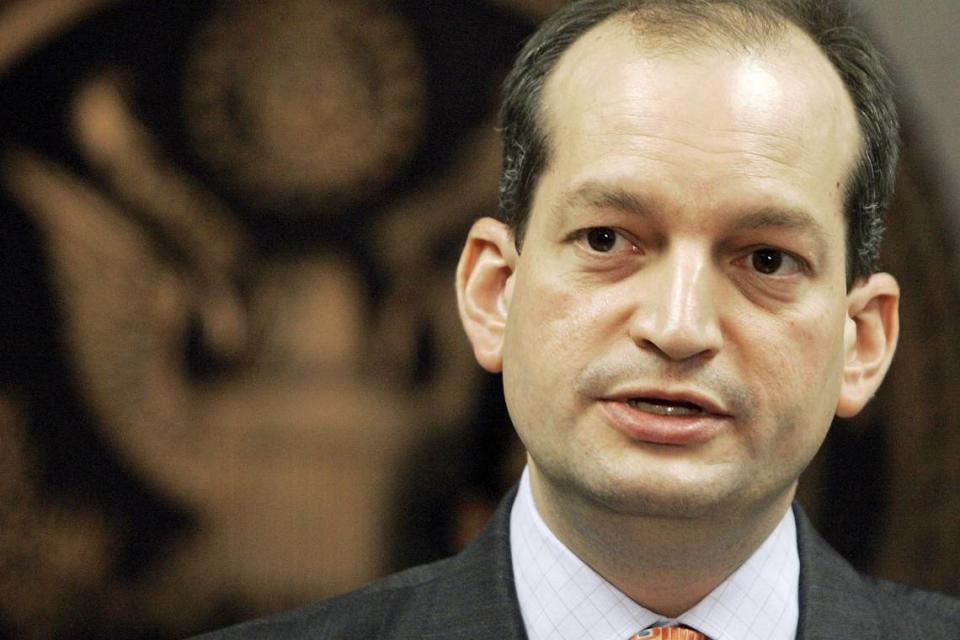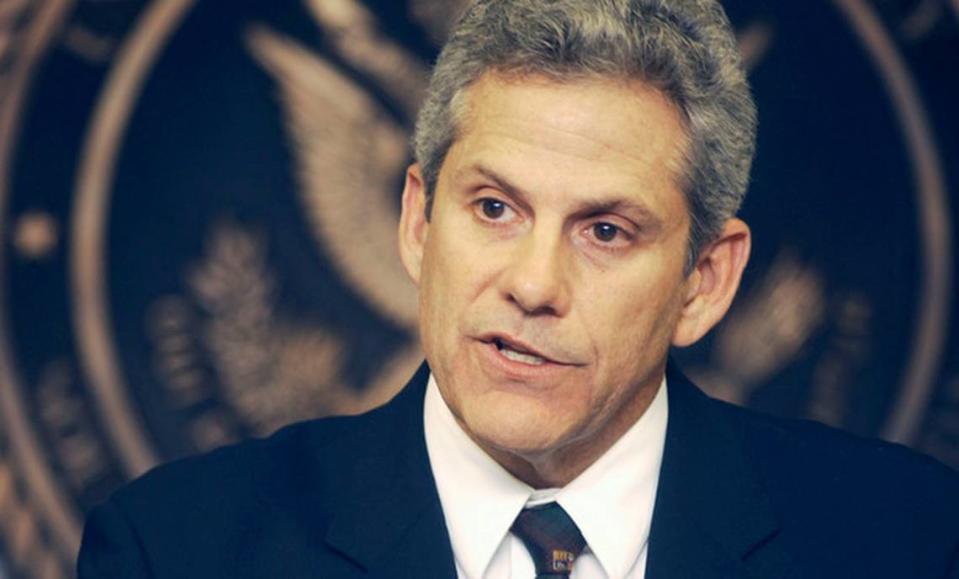FBI wanted to arrest Epstein while he was judging a beauty pageant. The plan was overruled
A Justice Department look-back report into its abortive 2008 prosecution of Jeffrey Epstein found that the Federal Bureau of Investigation had planned to arrest Jeffrey Epstein in May 2007, but pulled back after the U.S. Attorney’s Office for the Southern District of Florida, led by former Labor Secretary Alexander Acosta, frowned on the plan.
The report also concludes that Epstein wasn’t assisting the federal government in prosecuting Wall Street traders behind the collapse of investment bank Bear Stearns or serving as an “intelligence asset,” long rumored to be reasons for his notoriously lenient treatment.
That determination raises questions about an FBI document that seems to identify Epstein as providing information to the bureau.
Buried in a 350-page report by the agency’s Office of Professional Responsibility (OPR) — obtained by McClatchy and the Miami Herald — are references to a story that said Epstein was given a lighter sentence and avoided federal prosecution because he cooperated with authorities on other matters.
That was an “urban myth” federal prosecutor Ann Marie Villafaña told her superiors at the time, according to the new DOJ report, which said it found no evidence that he was a government witness.
It would seem at odds with a declassified FBI document, dated Sept. 18, 2008, in which the agency was closing out a forfeiture proceeding as part of a deal that allowed Epstein to be prosecuted on the state level and avoid more severe punishment by federal prosecutors.
“Epstein has also provided information to the FBI as agreed upon. Case agent advised that no federal prosecution will occur in this matter as long as Epstein continues to uphold his agreement with the State of Florida,” reads the declassified document. The document cited Epstein and child prostitution.
The document has led to the view that Epstein served as an informant. The OPR report, whose executive summary was made public Thursday, does not rule out that possibility but said it found no evidence of that status in relation to the Florida prosecution.
The report found that Acosta exercised poor judgment in reaching a non-prosecution agreement with Epstein, an agreement that allowed a more lenient state prosecution instead. It also faulted Acosta for failing to ensure that Epstein’s victims would be notified of developments in the case. Epstein would go on to plead guilty in June 2008 to two solicitation counts, one involving a minor, in Florida state court and serve 13 months in the private wing of the Palm Beach County stockade, allowed to leave and work from his West Palm Beach office up to 12 hours a day, six days a week.
The report shows that Villafaña, a federal prosecutor in the West Palm Beach office of the U.S. Attorney’s Office for Southern Florida, submitted an 82-page prosecution memorandum on May 1, 2007, for her superiors in the U.S. Attorney’s Office, including Acosta, proposing a 60-count indictment against Epstein for sex crimes against minors.
In a statement to the Herald on Thursday, she hinted at how she was thwarted and expressed disappointment the Justice Department didn’t publicly release the full document.
The Herald and McClatchy later obtained the full report, and it shows she planned to file charges by May 15, 2007, and the FBI had been hoping to arrest Epstein soon after at a beauty pageant in the Virgin Islands, where Epstein was serving as a judge, a fact first published by NBC News.
But Villafaña’s superiors in the Southern District of Florida, notably Jeffrey Sloman, Acosta’s top deputy, and Matthew Menchel, the chief of the office’s criminal division, pushed back on her efforts to file charges, arguing that they needed more time to evaluate her sentencing memorandum and wondering why she was in a “rush.” Sloman could not immediately be reached by the Herald.
Villafaña told the report’s authors that her reasons for wanting to rush were to prevent Epstein from abusing more girls.
“[C]hild sex offenders don’t stop until they’re behind bars,” she said.
Despite Villafaña’s efforts, Acosta ultimately decided months later not to bring charges against Epstein, out of deference to states’ rights and concern about “victim shaming” if Epstein’s accusers took the stand.
Acosta pushed back on the suggestion that his decision not to prosecute Epstein constituted poor judgment.
Acosta Statement Opr by Casey Frank on Scribd
“The Epstein case understood today is vastly more sweeping than what was understood in 2008,” Acosta said in a two-page statement to the Herald. “[H]ad Secretary Acosta known then what he knows now, he certainly would have directed a different path.”
The report suggests that rumors that Epstein was given leniency because of his cooperation in the Bear Stearns investigation, or any other matter, were inaccurate.
In July 2009, New York prosecutors investigating Bear Stearns reached out to Villafaña after the New York Post reported that Epstein, who had previously worked at Bear Stearns and been a major client, had been released early in Florida because of cooperation in the New York case. They told her they had “never heard of him” until the story and that he had not cooperated with their investigation.

Acosta himself fueled some speculation on the subject when he declined at a July 2019 news conference to deny outright whether he was made aware that Epstein was an “intelligence asset” at any point in his investigation.
“I can’t address it directly because of our guidelines, but I can tell you that a lot of reporting is just going down rabbit holes,” Acosta said at the time.
Asked by the report’s investigators if he had knowledge that Epstein was an “intelligence asset,” Acosta replied, “the answer is no.” The investigators noted that Acosta was offered a “classified setting to discuss intelligence information,” but appears not to have taken them up on it.

The question of whether Epstein was a government informant is the subject of a records request lawsuit against the FBI by Angela Clemente, a forensic paralegal who has doggedly dislodged FBI documents for more than a decade. Her past efforts have spotlighted how organized crime informants on the FBI payroll continued to carry out murders.
Clemente has asked a court to order the release of informant information on Epstein now that he is dead, having been found hanging in his jail cell in August 2019.
“I want his informant file. He was informing, where is his informant file? I want to know who he was informing on,” she said in a telephone interview. “This is the type of evidence they will definitely try to protect.”
The wording of the FBI document from 2008 is vague — deliberately vague by Clemente’s account.
“This is what they do, because they don’t want to identify them ever if they are cooperating,” she said, saying the organized crime informants generally don’t appear as such in public-facing FBI documents.
Her lawsuit has a status hearing on Nov. 23, with the FBI ordered in October to sit down and agree on a list of documents subject to release.
Miami Herald staff writer Jay Weaver contributed to this report.

